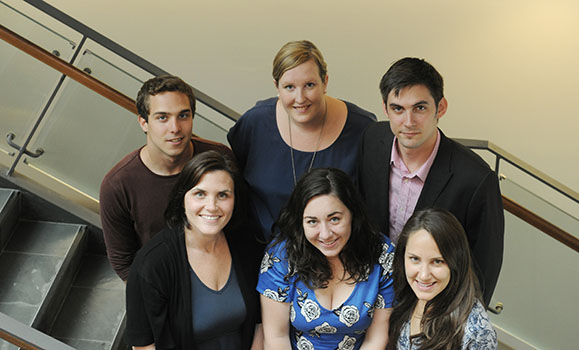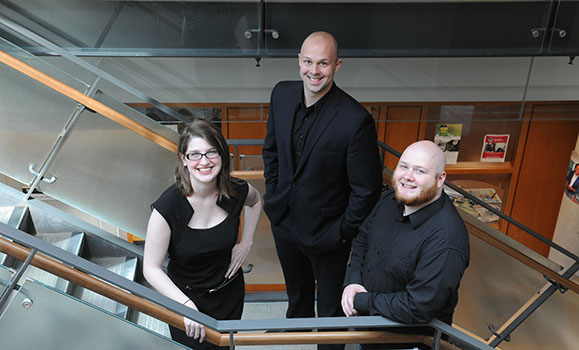When Dalhousie’s Faculty of Management began offering the three years ago, it didn’t take long for the profs who designed the class to realize they were onto something special.
Students who had hatched business ideas and joined together in teams to explore them a mere month or two prior were doing something rather remarkable by the end of term: signing up potential customers.
The cross-Faculty course was always meant to get students out of the classroom and into the real world of accelerated business creation, but teams in that first year and in subsequent years consistently came up with ideas that simply begged to be seen through to the next stage.
The only trouble was that just as some of these startups were beginning to capture people’s attention, the term would come to an end and students would be thrust back into the world of exams and summer jobs.
“Every May, I’d be saying ‘So what are you guys going to do? Are you going to move your idea forward?’” says Mary Kilfoil, who designed the course with fellow Dal prof Ed Leach based on the Lean model developed at the University of California (Berkley). “The answer was always very similar: ‘We’d love to, but we just don’t see how we can do it.’”
Bridging the gap
That all changed last year when Dr. Kilfoil and her colleagues launched an accelerator program to help bridge this gap between the talent and innovation coming out of the university and the broader startup community in Halifax and beyond.
Called the LaunchPad, the accelerator gives 10 groups eight weeks, face time with community mentors, and $10,000 in seed money to put toward refining their nascent business ideas.
Using the so-called "lean" approach to business development, teams explore the viability of their startup ideas through rigorous client outreach. The basic idea is to get as much feedback as possible early on so that products match more closely what customers want when they eventually get to market.
Dr. Kilfoil and Dr. Leach reasoned that if teams could make such great progress during the class while managing a full course load, imagine what they could do if given an extra eight weeks largely free of other obligations. They also decided to open the program up to others outside of Dal, provided they have at least one founding member who is a current student or a recent graduate of the university.
The second LaunchPad program wrapped up this past Tuesday with a showcase at the Killam Library, where teams were given seven minutes each to pitch their startups to a room of more than 70 venture capitalists, angel investors, business leaders and local community leaders.
Here’s a look at three of the promising startups from this year’s program.
Eyeread
 The Eyeread team: (Front row, left to right) Julia Rivard, Emily Miller, Leah Skerry. (Back row, left to right) David Sharpe, Katie Gillivan, Jason Hopper.
The Eyeread team: (Front row, left to right) Julia Rivard, Emily Miller, Leah Skerry. (Back row, left to right) David Sharpe, Katie Gillivan, Jason Hopper.
has designed a web-based app that aims to improve the way young children's literacy levels are assessed and diagnosed by integrating reading assessments into tablet computers using artificial intelligence and a series of eye-tracking, voice and touch inputs. Data picked up during use by the children help to reveal the students who are on track and those who are at risk.
Participating in Dal's LaunchPad Accelerator was instrumental in helping the team line up 10 pilot partners, including literacy training outfit Halifax Learning, among others. That will give the Eyeread team access to data from 2,500 children this summer to help refine their platform even more.
“Instead of making this perfect system that you assume people are going to use, you test your assumptions as early as you can. That’s really valuable,” says co-founder Leah Skerry, who is a Saint Mary’s graduate and partner at Halifax-based web design agency Norex.
The team's immediate plan is to gather more data on the assessment tool so they can improve the platform with the goal of offering remedial tools that help kids improve their literacy skills. That will open up potential new revenue streams for the startup, which plans to sell directly to private learning centres and schools.
Investors have already taken notice. The team raised $230,000 during the accelerator and hopes to surpass its $300,000 target to close its first funding round soon. By the end of the summer, it hopes to start a new $1.5-million funding round.
Pet Konekt

Pet Konekt founder Justin Jarovek, centre, with teamates Julia Bulfon, left, and Shawn MacBurnie, right.
was born as an idea in the Starting Lean course this year when a friend of student Justin Javorek’s was looking for an easy way to find pet services for her new French bulldog, Frankie. Javorek noticed there was no one-stop shop or online community for pet owners to easily find and book appointments with the most reputable trainers, groomers and veterinarians in different neighbourhoods, so he decided to create one.
Fast forward to this past Tuesday's pitch event and it's clear the idea has come a long way in just a few short months. In addition to offering free services to pet owners, the team has begun building a paid customer management and scheduling platform to help veterinarians and other pet service providers boost revenues by winning over and retaining new customers.
Pet Konekt aims to increase customer retention and commitment by making it easy for clinics and companies to send automated text and email reminders to clients about medications and appointments.
The accelerator program gave the team the chance to validate demand for a paid service. "You get a lot of early adopters by actually talking to them and figuring out what their pains and problems are," explains Javorek.
An international student who came to Dal on a hockey scholarship, Javorek has big ambitions for Pet Konekt, but insists Halifax is a great place to be headquartered. “We want to be in New York, Toronto and Boston, but I would run it from here,” he says.
Site2020

Site2020 co-founders Mitch Hollohan, left, and Cole Campbell.
Dal students Cole Campbell and Mitch Hollohan joined forces in the Starting Lean course this past winter. Their startup, Site2020, aims to help construction firms make road site operations safer and cheaper by replacing an expensive three-person team of flaggers — the people who hold the road signs — with an automated system that requires only one employee.
Site2020 offers two remote traffic signals placed at each end of a construction site mounted with cameras, which feed video of traffic back to a custom tablet monitored by an operator stationed in a safe space on the site.
"Construction companies would buy this because immediately when you put this thing out on the road you're saving over 40 per cent of your wages and that's a conservative number," says Campbell.
The accelerator program gave Campbell and Hollohan the time and resources to secure a patent, build a rough prototype, hire a software developer and put Site2020 through its paces in a startup bootcamp.
While the team says it'll need until next February to put together a market-ready prototype, it has generated enough customer interest that it plans to start reaching out to investors this month. Campbell credits the Starting Lean approach for the early success: "Understanding if there is a market there. It's a really smart way to do business."
Making an impact
Dr. Kilfoil says Dal may look at expanding LaunchPad to offer three separate cohorts a year the chance to take part. With roughly 45 to 50 local community leaders now engaged in working with groups in the accelerator, the program is keeping talented Dal students and participants in N.S., she says.
"As they build networks and are introduced to more people, they start to realize 'Yes, we could launch this company right here in Nova Scotia," she says.
Interested in pitching your startup in the LaunchPad accelerator or being a mentor? about the program and the Starting Lean initiative at Dal.

